《英语-科技写作与沟通技巧》Lecture-1
- 格式:ppt
- 大小:2.12 MB
- 文档页数:51
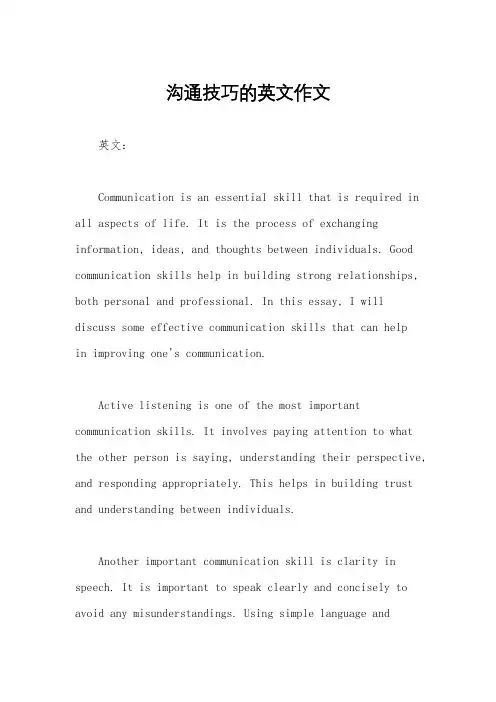
沟通技巧的英文作文英文:Communication is an essential skill that is required in all aspects of life. It is the process of exchanging information, ideas, and thoughts between individuals. Good communication skills help in building strong relationships, both personal and professional. In this essay, I will discuss some effective communication skills that can helpin improving one's communication.Active listening is one of the most important communication skills. It involves paying attention to what the other person is saying, understanding their perspective, and responding appropriately. This helps in building trust and understanding between individuals.Another important communication skill is clarity in speech. It is important to speak clearly and concisely to avoid any misunderstandings. Using simple language andavoiding technical jargon can help in ensuring that the message is conveyed effectively.Non-verbal communication is also an important aspect of communication. It includes body language, facial expressions, and tone of voice. These non-verbal cues can convey a lot of information about a person's emotions and intentions.In addition to these skills, it is important to be aware of cultural differences in communication. Different cultures have different communication styles, and being aware of these differences can help in avoiding misunderstandings and building strong relationships.In conclusion, effective communication skills are essential for building strong relationships and achieving success in both personal and professional life. Active listening, clarity in speech, non-verbal communication, and cultural awareness are some of the key skills that can help in improving one's communication.中文:沟通是生活中必不可少的技能,在个人和职业生活中都有着重要的作用。

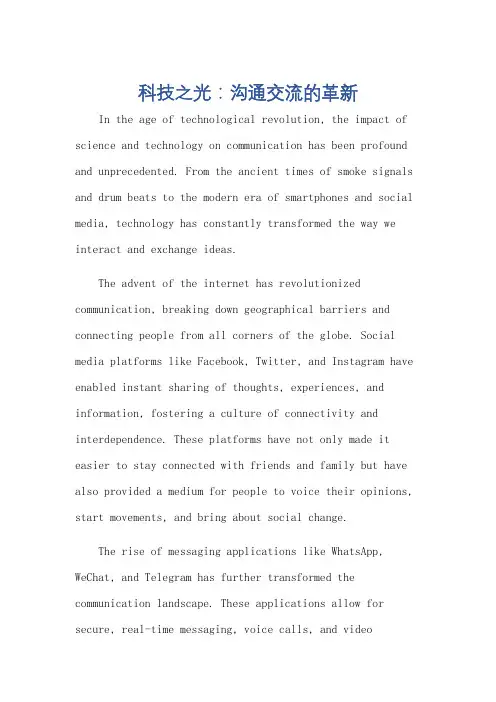
科技之光:沟通交流的革新In the age of technological revolution, the impact of science and technology on communication has been profound and unprecedented. From the ancient times of smoke signals and drum beats to the modern era of smartphones and social media, technology has constantly transformed the way we interact and exchange ideas.The advent of the internet has revolutionized communication, breaking down geographical barriers and connecting people from all corners of the globe. Social media platforms like Facebook, Twitter, and Instagram have enabled instant sharing of thoughts, experiences, and information, fostering a culture of connectivity and interdependence. These platforms have not only made it easier to stay connected with friends and family but have also provided a medium for people to voice their opinions, start movements, and bring about social change.The rise of messaging applications like WhatsApp, WeChat, and Telegram has further transformed the communication landscape. These applications allow for secure, real-time messaging, voice calls, and videoconferencing, eliminating the need for traditional phone calls or face-to-face meetings. Businesses have also leveraged these technologies to collaborate more efficiently, with tools like Slack and Microsoft Teams facilitating seamless communication among teams across different time zones and locations.Artificial intelligence (AI) and machine learning have also begun to reshape communication. Chatbots and virtual assistants, powered by AI, can now handle customer service inquiries, provide personalized recommendations, and even engage in conversation. These technologies not only improve efficiency but also enable companies to provide a more personalized and responsive customer experience.The impact of technology on communication is notlimited to the virtual world. The development of video conferencing and telepresence technologies has made remote work a reality, allowing individuals to participate in meetings and collaborations regardless of their physical location. Similarly, the advent of wearable devices like smartwatches and virtual reality (VR) headsets has thepotential to further revolutionize the way we communicate, enabling more immersive and interactive experiences.However, while the benefits of technological advancements in communication are numerous, they are not without their challenges. The proliferation of social media and other digital platforms has led to the rise of cyberbullying, misinformation, and privacy concerns. It is crucial that we continue to discuss and debate the ethical implications of these technologies and ensure that they are used responsibly and to benefit society at large.In conclusion, the influence of technology on communication has been profound, reshaping the way we connect, interact, and exchange ideas. As we continue to embrace these advancements, it is important to remain vigilant about their potential downsides and strive to create a more inclusive and responsible digital world.**科技之光:沟通交流的革新**在科技革命的时代,科技对沟通的影响深远且前所未有。
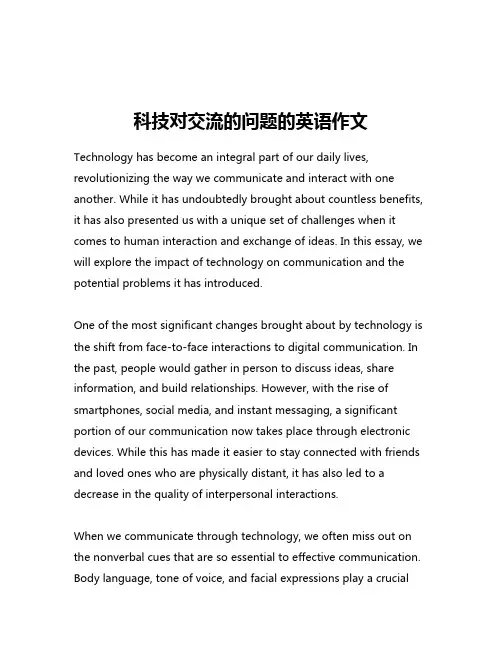
科技对交流的问题的英语作文Technology has become an integral part of our daily lives, revolutionizing the way we communicate and interact with one another. While it has undoubtedly brought about countless benefits, it has also presented us with a unique set of challenges when it comes to human interaction and exchange of ideas. In this essay, we will explore the impact of technology on communication and the potential problems it has introduced.One of the most significant changes brought about by technology is the shift from face-to-face interactions to digital communication. In the past, people would gather in person to discuss ideas, share information, and build relationships. However, with the rise of smartphones, social media, and instant messaging, a significant portion of our communication now takes place through electronic devices. While this has made it easier to stay connected with friends and loved ones who are physically distant, it has also led to a decrease in the quality of interpersonal interactions.When we communicate through technology, we often miss out on the nonverbal cues that are so essential to effective communication. Body language, tone of voice, and facial expressions play a crucialrole in conveying meaning and understanding. Without these elements, it can be challenging to fully grasp the nuances of a conversation, leading to misunderstandings and miscommunications. This can be particularly problematic in professional settings, where clear and effective communication is crucial for collaboration and decision-making.Furthermore, the constant availability of digital devices and the pressure to respond quickly to messages can lead to a sense of disconnection and a lack of genuine engagement. People may find themselves constantly checking their phones, interrupting face-to-face conversations, or feeling the need to respond immediately to every message, even if it means sacrificing their own personal time and attention. This can create a sense of fragmentation and a lack of focus, making it difficult to truly connect with others and have meaningful exchanges.Another issue that arises from the widespread use of technology in communication is the potential for a loss of empathy and emotional intelligence. When we interact through screens, it can be easier to detach ourselves from the emotional experiences of others. We may be more inclined to express opinions or make statements that we would not feel comfortable saying in person, leading to a lack of consideration for the feelings and perspectives of others. This can have far-reaching consequences, particularly in the realm of onlinediscourse, where anonymity and the lack of face-to-face interaction can foster a culture of disrespect, hostility, and a lack of compassion.Additionally, the proliferation of social media and the constant exposure to carefully curated online personas can lead to a distorted perception of reality. People may compare themselves to the idealized versions of others, leading to feelings of inadequacy, low self-esteem, and a sense of disconnection from their own authentic selves. This can have a detrimental impact on mental health and overall well-being, as individuals may struggle to find a sense of belonging and purpose in a world that seems increasingly disconnected.It is important to note that technology itself is not inherently good or bad; it is the way we choose to use it that can have a significant impact on our communication and interpersonal relationships. By being mindful of the potential pitfalls of technology-mediated communication and making conscious efforts to maintain a balance between digital and face-to-face interactions, we can harness the power of technology to enhance, rather than hinder, our ability to connect with others.One potential solution to the challenges posed by technology in communication is to prioritize the development of digital etiquette and communication skills. This can involve teaching individuals,particularly younger generations, the importance of active listening, empathy, and emotional intelligence in digital interactions. Educators and policymakers can play a crucial role in incorporating these skills into the curriculum, helping individuals navigate the digital landscape in a more thoughtful and responsible manner.Furthermore, individuals can make conscious efforts to set boundaries and create opportunities for genuine human connection. This may involve designating technology-free zones or periods, actively engaging in face-to-face conversations, and making a concerted effort to be present and attentive during social interactions. By striking a balance between digital and analog communication, we can preserve the benefits of technology while mitigating its potential negative impact on our interpersonal relationships and overall well-being.In conclusion, the impact of technology on communication is a complex and multifaceted issue. While it has undoubtedly brought about numerous advantages, it has also introduced a set of challenges that we must address. By acknowledging the potential pitfalls of technology-mediated communication and taking proactive steps to maintain a healthy balance between digital and face-to-face interactions, we can harness the power of technology to enhance our ability to connect, collaborate, and thrive in the modern world.。


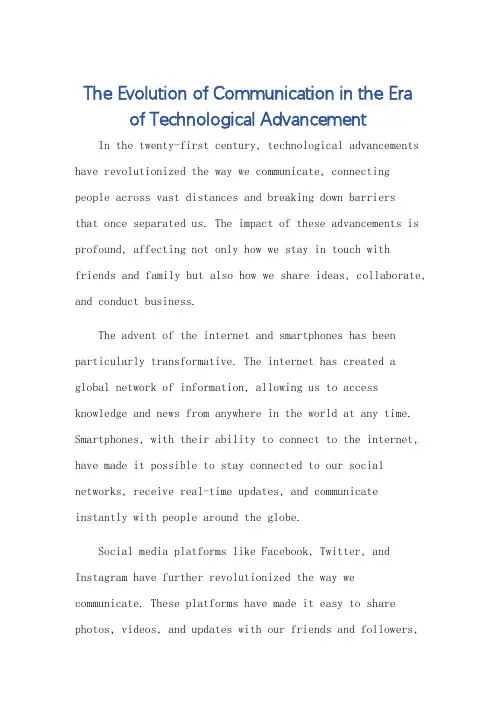
The Evolution of Communication in the Era of Technological AdvancementIn the twenty-first century, technological advancements have revolutionized the way we communicate, connecting people across vast distances and breaking down barriersthat once separated us. The impact of these advancements is profound, affecting not only how we stay in touch with friends and family but also how we share ideas, collaborate, and conduct business.The advent of the internet and smartphones has been particularly transformative. The internet has created a global network of information, allowing us to access knowledge and news from anywhere in the world at any time. Smartphones, with their ability to connect to the internet, have made it possible to stay connected to our social networks, receive real-time updates, and communicate instantly with people around the globe.Social media platforms like Facebook, Twitter, and Instagram have further revolutionized the way we communicate. These platforms have made it easy to share photos, videos, and updates with our friends and followers,fostering a sense of community and connection. They havealso given voice to those who may have been previously marginalized, allowing them to share their stories and perspectives with a wider audience.Video conferencing tools like Zoom and Skype have made remote work and collaboration possible. These tools allow people to meet face-to-face, despite being located in different parts of the world. They have enabled businessesto expand their reach and hire talent from anywhere, while also allowing families to stay connected during long-distance relationships.Messaging apps like WhatsApp and WeChat have simplified the process of sending messages and making calls, whether they are local or international. These apps have providedan alternative to traditional phone calls and text messages, offering a more convenient and cost-effective way to stayin touch.The impact of technological advancements on communication is not limited to personal use. In the fieldof education, online courses and virtual classrooms have made it possible for students to learn from anywhere in theworld, without having to be physically present in a classroom. Similarly, in the medical field, telemedicine has allowed doctors to consult with patients remotely, providing timely and effective care.Overall, the technological advancements in communication have brought about significant changes in how we interact with each other. They have made the world more connected and accessible, allowing us to share information, ideas, and experiences more easily than ever before. As we continue to embrace these advancements, it is likely that the way we communicate will continue to evolve and transform.**科技进步带来的沟通交流之变**在二十一世纪,科技进步彻底改变了我们的沟通方式,将人们紧密地联系在一起,打破了曾经的隔阂。
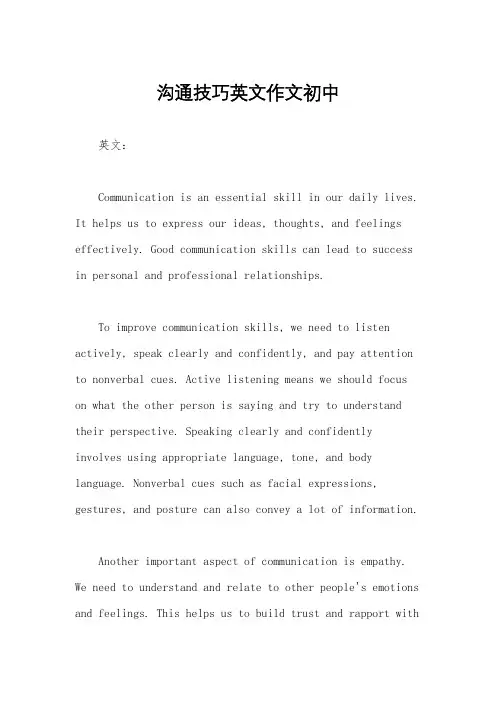
沟通技巧英文作文初中英文:Communication is an essential skill in our daily lives. It helps us to express our ideas, thoughts, and feelings effectively. Good communication skills can lead to success in personal and professional relationships.To improve communication skills, we need to listen actively, speak clearly and confidently, and pay attention to nonverbal cues. Active listening means we should focus on what the other person is saying and try to understand their perspective. Speaking clearly and confidently involves using appropriate language, tone, and body language. Nonverbal cues such as facial expressions, gestures, and posture can also convey a lot of information.Another important aspect of communication is empathy. We need to understand and relate to other people's emotions and feelings. This helps us to build trust and rapport withothers.In addition, we should be aware of cultural differences in communication. What may be appropriate in one culture may not be in another. We should respect and appreciate different cultural norms and adjust our communication style accordingly.Finally, practice makes perfect. We should practice our communication skills regularly, whether it's through conversations with friends or family, or through public speaking or presentations.中文:沟通技巧是我们日常生活中必不可少的技能。
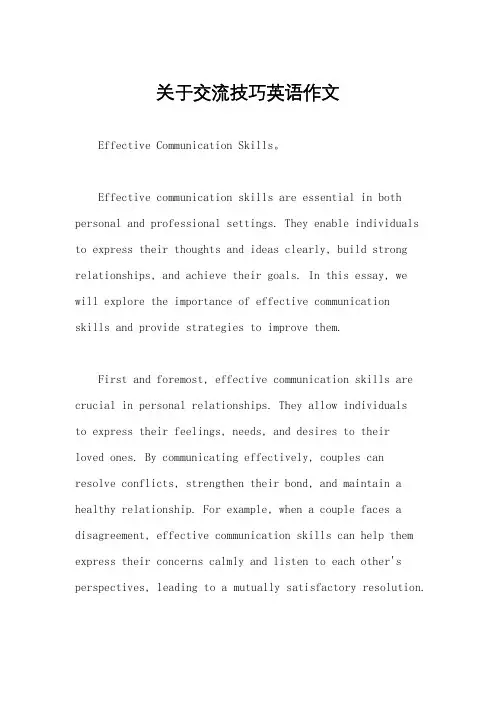
关于交流技巧英语作文Effective Communication Skills。
Effective communication skills are essential in both personal and professional settings. They enable individuals to express their thoughts and ideas clearly, build strong relationships, and achieve their goals. In this essay, wewill explore the importance of effective communicationskills and provide strategies to improve them.First and foremost, effective communication skills are crucial in personal relationships. They allow individualsto express their feelings, needs, and desires to theirloved ones. By communicating effectively, couples can resolve conflicts, strengthen their bond, and maintain a healthy relationship. For example, when a couple faces a disagreement, effective communication skills can help them express their concerns calmly and listen to each other's perspectives, leading to a mutually satisfactory resolution.Furthermore, effective communication skills are vitalin professional settings. They enable individuals to convey their ideas and opinions clearly, collaborate with colleagues, and succeed in their careers. Effective communication skills can also enhance leadership abilities, as leaders need to communicate their vision and goals to their team members. Additionally, effective communication fosters a positive work environment, where employees feel valued and understood. For instance, a manager who communicates effectively can motivate and inspire their team, leading to increased productivity and job satisfaction.To improve communication skills, one can employ several strategies. Firstly, active listening is essential. This involves fully concentrating on the speaker, avoiding distractions, and providing feedback to demonstrate understanding. By actively listening, individuals can comprehend the speaker's message accurately and respond appropriately. Secondly, clarity and conciseness arecrucial in effective communication. Using clear and concise language helps to convey ideas and information moreeffectively, reducing the chance of misunderstandings. Additionally, non-verbal communication, such as body language and facial expressions, can enhance the effectiveness of communication. For example, maintainingeye contact and using appropriate gestures can convey interest and engagement in a conversation.Moreover, empathy plays a significant role in effective communication. Understanding and acknowledging the emotions and perspectives of others can help build trust and rapport. By showing empathy, individuals can create a safe and supportive environment, where open and honest communication can thrive. Furthermore, being aware of culturaldifferences is essential for effective communication, particularly in a diverse workplace. By respecting and understanding different cultural norms and practices, individuals can avoid misunderstandings and foster a harmonious work environment.In conclusion, effective communication skills are vital for personal and professional success. They enable individuals to express themselves clearly, build strongrelationships, and achieve their goals. By actively listening, using clear language, and showing empathy, individuals can improve their communication skills and create a positive and productive environment. Therefore, it is crucial to continuously develop and refine these skills to thrive in various aspects of life.。
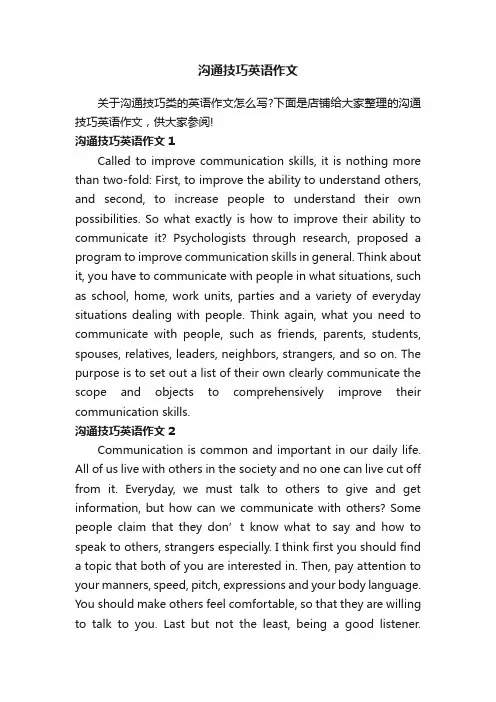
沟通技巧英语作文关于沟通技巧类的英语作文怎么写?下面是店铺给大家整理的沟通技巧英语作文,供大家参阅!沟通技巧英语作文1Called to improve communication skills, it is nothing more than two-fold: First, to improve the ability to understand others, and second, to increase people to understand their own possibilities. So what exactly is how to improve their ability to communicate it? Psychologists through research, proposed a program to improve communication skills in general. Think about it, you have to communicate with people in what situations, such as school, home, work units, parties and a variety of everyday situations dealing with people. Think again, what you need to communicate with people, such as friends, parents, students, spouses, relatives, leaders, neighbors, strangers, and so on. The purpose is to set out a list of their own clearly communicate the scope and objects to comprehensively improve their communication skills.沟通技巧英语作文2Communication is common and important in our daily life. All of us live with others in the society and no one can live cut off from it. Everyday, we must talk to others to give and get information, but how can we communicate with others? Some people claim that they don’t know what to say and how to speak to others, strangers especially. I think first you should find a topic that both of you are interested in. Then, pay attention to your manners, speed, pitch, expressions and your body language. You should make others feel comfortable, so that they are willing to talk to you. Last but not the least, being a good listener.Listening to others shows your respect to them. Only when they heard, they want to talk. So do you. Before you talk, listening to others first.沟通技巧英语作文3CommunicationIs of Utmost ImportanceWe cannot ignore the reality thatcollege students in mounting numbers are suffering from mental problems. One ofthe leading factors in this is that students do not communicate properly withtheir surroundings. Communication plays a pivotal role in college students' physicaland mental health.Firstly,communication can help expand social networks by establishing a channel betweenstrangers. More friends guarantee a more colorful life. Secondly, mutualunderstanding is promoted by communication as people work together. Colleaguesfoster trust through communication and this can strengthen team spirit, whichmay enhance working efficiency. Thirdly, through talking one can obtain a greatdeal of useful information, which may be very helpful to students and graduatesas they learn how to live their lives.Tosum up, communication is of utmost importance to college students, as well asto people in general. “Communicate more, own more.” We cannot emphasize thesignificance of communication too much.参考译文沟通至关重要我们无法忽略这样一个事实:越来越多的大学生正在承受心理问题的折磨。

沟通的技巧英文作文英文回答:Effective communication is a vital skill in both personal and professional life. It allows us to express our thoughts and feelings, build relationships, and achieve our goals. There are many different theories and models of communication, but some of the key principles include:Clarity: Being clear and concise in your communication is essential for getting your message across effectively. This means using language that your audience will understand and avoiding jargon or technical terms.Empathy: Empathy is the ability to understand and share the feelings of others. When you are communicating with someone, try to see things from their perspective and understand their needs. This will help you build rapport and communicate more effectively.Active listening: Active listening is more than just hearing what someone says. It involves paying attention to both the verbal and nonverbal messages that they are sending. When you are actively listening, you are showing the other person that you are interested in what they have to say and that you value their opinion.Feedback: Feedback is an important part of communication. It allows you to check that your message has been understood and to get feedback on your own communication style. When you give feedback, be specific and constructive. Focus on the behavior rather than the person, and offer suggestions for improvement.Nonverbal communication: Nonverbal communication is a powerful tool that can communicate a lot about your thoughts and feelings. Be aware of your body language, eye contact, and tone of voice. These nonverbal cues can help you to build rapport, create a positive atmosphere, and communicate your message more effectively.By following these principles, you can improve yourcommunication skills and become a more effective communicator.中文回答:沟通技巧。
关于科技影响沟通交流的英语作文Technology has greatly influenced communication and has revolutionized the way we interact with others. In this essay, I will discuss how technology has impacted communication and its implications.Firstly, technology has made communication faster and more efficient. The advent of smartphones and instant messaging apps allows us to connect with others instantaneously, irrespective of geographical barriers. We can now send messages, make video calls, and share media instantly, which has greatly improved the speed and efficiency of communication. For example, I can easily communicate with my friends and family who live indifferent countries through video calls, eliminating the need for long-distance phone calls or physical letters.Secondly, technology has expanded the reach of communication. Social media platforms, such as Facebook, Instagram, and Twitter, have created a virtual space where people can connect and share their thoughts, experiences, and photos with others. This has given individuals the ability to communicate and interact with a larger audience,transcending the limitations of physical distance. It has also provided a platform for marginalized voices and minority groups to express themselves and share their stories.Moreover, technology has enriched communication with various multimedia elements. Through the use of emojis, GIFs, and stickers, we can convey emotions and expressions more effectively in our digital conversations. These visual elements help to make our communication more engaging and expressive, bridging the gap between face-to-face interactions and online conversations. Additionally, the integration of photos, videos, and audio messages in messaging apps has enhanced the overall communication experience, allowing us to share experiences in a more immersive way.However, technology has also posed challenges to communication. The overreliance on digital communication has led to a decline in face-to-face interactions and the loss of personal connections. People now tend to communicate through screens rather than engaging in real-life conversations. This can lead to a lack of emotionalconnection and understanding, which are vital components of effective communication. Moreover, the constant exposure to screens and notifications can be overwhelming and distracting, hindering our ability to fully engage in meaningful conversations.In conclusion, technology has undoubtedly revolutionized communication by making it faster, more efficient, and accessible. It has expanded the reach of communication, enriched it with multimedia elements, and provided new platforms for expression. However, it is important tostrike a balance between digital communication and face-to-face interactions to maintain personal connections and ensure effective communication.。
沟通技巧英文作文Title: Effective Communication Skills。
Communication is an essential aspect of human interaction, serving as the foundation for building relationships, resolving conflicts, and achieving common goals. Effective communication skills are not only valuable in personal relationships but also crucial in professional settings. In this essay, we will explore various aspects of effective communication and strategies to enhance it.Firstly, active listening is fundamental to effective communication. Active listening involves fullyconcentrating on what the speaker is saying, understanding their message, and responding appropriately. It requiresnot only hearing the words but also interpreting thespeaker's tone, body language, and emotions. By actively listening, individuals can demonstrate empathy, build trust, and foster deeper connections with others.Another important aspect of effective communication is clarity and conciseness in expression. Clear and concise communication ensures that the intended message is understood without ambiguity or confusion. Using simple language, avoiding jargon, and organizing thoughts coherently can help convey messages more effectively. Additionally, being mindful of cultural differences and adjusting communication style accordingly can facilitate better understanding across diverse audiences.Nonverbal communication also plays a significant rolein conveying messages. Body language, facial expressions, gestures, and posture can often speak louder than words. Being aware of these nonverbal cues and ensuring they align with verbal communication can enhance the clarity and impact of the message. Maintaining eye contact, using appropriate facial expressions, and adopting open body language can signal attentiveness and sincerity in communication.Furthermore, empathy and emotional intelligence are essential components of effective communication. Empathyinvolves understanding and sharing the feelings of others, which can foster rapport and mutual understanding. By acknowledging and validating others' emotions, communicators can create a supportive and empathetic environment conducive to open dialogue and collaboration. Emotional intelligence, which encompasses self-awareness, self-regulation, social awareness, and relationship management, enables individuals to navigate interpersonal dynamics and communicate with sensitivity and tact.In addition to interpersonal communication skills, effective communication in professional settings often requires proficiency in written communication. Clear and concise writing, proper grammar and punctuation, and formatting consistency are crucial for conveying professionalism and credibility in written communication. Whether composing emails, reports, or presentations, mastering written communication skills is essential for effective collaboration and information exchange in the workplace.Moreover, adaptability and flexibility are keyattributes of effective communicators. Recognizing that communication styles and preferences vary among individuals, being adaptable allows communicators to adjust their approach to suit the needs and preferences of different audiences. Whether communicating with superiors, peers, subordinates, or clients, being flexible in communication style and delivery can facilitate smoother interactions and foster positive relationships.Lastly, feedback is an integral part of the communication process and essential for continuous improvement. Soliciting feedback from others, actively listening to their perspectives, and incorporating constructive criticism can help individuals refine their communication skills and address areas for growth. Additionally, providing feedback in a constructive and respectful manner promotes a culture of open communication and mutual learning within teams and organizations.In conclusion, effective communication skills are indispensable for navigating interpersonal relationships, achieving organizational objectives, and fosteringcollaboration and innovation. By cultivating active listening, clarity in expression, awareness of nonverbal cues, empathy, emotional intelligence, proficiency in written communication, adaptability, and receptivity to feedback, individuals can become more effective communicators in both personal and professional contexts. Ultimately, mastering these communication skills empowers individuals to connect authentically, resolve conflicts constructively, and achieve shared goals collaboratively.。
科技对交流沟通的影响英语作文In the age of digital enlightenment, where the world is just a swipe away, the impact of technology on communication is as profound as it is pervasive. It's like the wild west of the 21st century, where the only thing faster than a bulletis an email.Imagine a time when the fastest mode of communication was a horse galloping across the plains, carrying a message that could take days to reach its destination. Fast forward to today, where a simple "ping" can send a message across the globe in less than a second. It's like teleporting your words without the need for a DeLorean.The advent of smartphones has turned us into digital cowboys, always ready to draw at the drop of a hat. We've got our fingers on the trigger, ready to text, tweet, or post at a moment's notice. It's like the old Wild West, but instead of gunslingers, we've got keyboard warriors.Social media platforms have become the new saloons, where everyone can strut their stuff and share their thoughts. It's a place where you can be a lone ranger, venturing out into the vast digital frontier, or join a posse and ride together in a herd.But with great power comes great responsibility. Just as a cowboy needs to know when to holster his gun, we need to bemindful of how we use technology to communicate. It's easy to get caught up in the digital dust storm and lose sight of the real world.The rise of video calls has brought a new dimension toour conversations. It's like having a magic window into someone's life, where you can see their every move, heartheir every word, and even share a virtual cup of coffee.It's like being in the same room, but without the need for a time machine.Yet, the digital divide remains. Not everyone has accessto the latest gadgets and gizmos. It's like having a map ofthe Wild West, but only being able to explore a small cornerof it. We must ensure that as we gallop towards the future,we don't leave anyone behind.In conclusion, technology has revolutionized the way we communicate, turning us into modern-day pioneers of a digital frontier. It's a wild ride, full of excitement and challenges, but with the right tools and attitudes, we can make sure it's a journey worth taking. So, saddle up and let's ride into the sunset of communication, with our fingers on the pulse of the world.。
科技影响交流作文英文范文Technology has greatly impacted communication in various ways. Firstly, the rise of social media platforms has revolutionized how we connect with others. With just a few taps on our smartphones, we can instantly reach out to friends and family, share updates, and engage in conversations. This has made communication more convenient and efficient, allowing us to stay connected regardless of time and distance. 。
Additionally, technology has also transformed the way we communicate in professional settings. The advent of email, video conferencing, and instant messaging has madeit easier for businesses to collaborate and communicate with clients and colleagues from all over the world. This has not only increased productivity but also opened up new opportunities for global partnerships and collaborations.Moreover, technology has given us access to a wealth of information and knowledge. With search engines and onlinedatabases, we can quickly find answers to our questions and stay updated on current events. This has not only expanded our understanding of the world but also enabled us to engage in more informed and meaningful discussions.Furthermore, technology has introduced new modes of communication, such as video calls and voice messages. These tools allow us to convey emotions and nuances that may be lost in text-based communication. For example, a video call can provide a more personal and interactive experience, allowing us to see and hear the other person in real-time. Voice messages, on the other hand, can add a personal touch to our messages, as the tone and intonation can convey emotions that may be difficult to express in writing.Lastly, technology has also brought about challenges in communication. The constant connectivity and the abundance of information can sometimes lead to information overload and a lack of focus. Additionally, the reliance on digital communication may result in a loss of face-to-face interaction and the development of essential social skills.In conclusion, technology has had a profound impact on communication. It has made communication more convenient, efficient, and accessible. However, it is important to strike a balance and ensure that technology does not hinder our ability to engage in meaningful face-to-face interactions.。